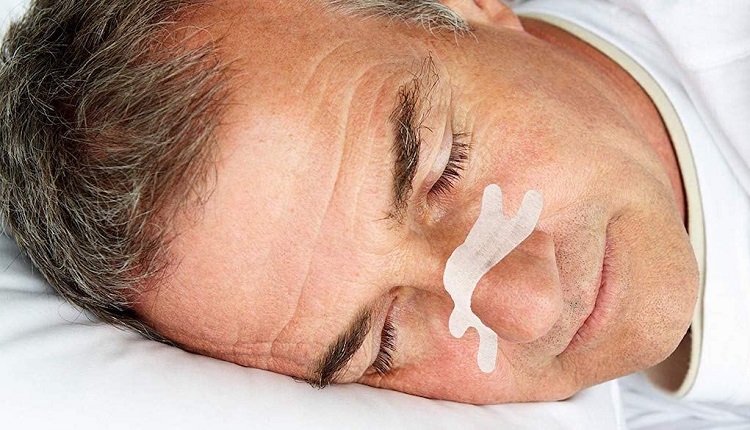Getting a good’s night sleep is essential for your health and wellbeing, but when something like snoring is preventing it from happening, you’ll try just about anything to remedy it.
Whether it’s you with the snoring problem keeping others awake or your partner doing the noisy sleeping, you’ve probably considered nose strips before.
Do nose strips for snoring work?
Yes, nose strips can help reduce snoring in some cases, as they open up the nasal passages to allow for easier and quieter breathing while you sleep. However, they don’t work for everyone and they can be expensive and wasteful to continue buying, so this should be considered as well.
To dive deeper into what nose strips are capable of and whether they’re the ideal solution, we’ll look at how they work and what other options you can try if you’re getting sick and tired of a snoring problem at home.
A simple reduction in sound can dramatically improve your quality of sleep, and ensure the rest of your household is getting the same.
Why Do People Snore?
Snoring is a common issue that affects roughly 90 million Americans, and the causes can range from something simple like changes in weather or more serious conditions like Obstructive Sleep Apnea.
These are just a few of the reasons you might be suffering from snoring at night:
- Sleep apnea: This medical condition occurs in around half of usual snorers, and it’s a sleep disorder that means you effectively stop breathing throughout the night.
- Nasal issues: A cold, hay fever or sinus problems will make your breathing more difficult which can cause snoring, whether it’s temporary or permanent.
- Physical differences: Some people have anatomical differences that cause snoring, including narrower airways, smaller throat, adenoids that are largened, or a cleft palate.
- Alcohol, drugs, and medication: Smoking cigarettes, drinking alcohol and taking prescription and recreational drugs can all lead to snoring because they relax the muscles of the throat.
- Weight: Being overweight makes one more susceptible to snoring, as the excess weight in your neck and throat can make it harder for air to travel through freely.
What is a Nose Strip and Does It Work?

This type of nose strip is a type of nasal dilator designed for reducing snoring while you sleep and can give some users relief. There are two types of nasal dilators, including the nose strip, and the kind that dilates the nostrils from inside your nose to have the same effect.
Using an external dilator strip, you apply the Band-Aid-like device to the outside of your nose.
The stiff strip is hard enough to pull the outer edges of the nostril up, which is thought to open up the nasal airways and increase airflow so that it can pass through down into your lungs without obstruction, resulting in a reduction or cessation of snoring.
The effectiveness of these strips is not absolute though, with some people finding relief from them and others not.
It depends on the type of dilator used, the quality of the product, and what the cause of someone’s snoring is as to how effective it will be. If you’re ready to get rid of snoring once and for all though, they’re worth a shot.
Possible Ways to Reduce Snoring
If you’ve ever had to lay next to a snoring person before, you’ve probably laid awake in the middle of the night racking your brain for solutions to get them to stop.
For the snorer, it’s an embarrassing and sometimes dangerous problem that needs to be rectified as well. If the nose strips haven’t been effective in stopping the snoring, these are some other methods you can try to get relief:
- Change your sleeping position: The best position for a snoring person to sleep on is their side, and never on their back. If you don’t want to switch from laying on your back, keep your head elevated at least four inches by stacking pillows, and this will allow for a clearer path through your airways.
- Add moisture to the air: If you live in a dry climate or sleep with an air conditioner, adding some more moisture to the night air can help. Using a humidifier in the bedroom will add moisture and create less irritation on your throat membranes which can sometimes lead to snoring.
- Increase exercise: Becoming regularly active can help tone muscles in the body that assist with breathing, which is then used at night. You can also focus on throat exercises designed to tone these muscles specifically and see if it brings some relief.
- Lose weight: Even just a few pounds difference in weight can reduce snoring, and it’s good for your health as well. Get an idea of where your healthy BMI is and take steps to reduce it if you’re overweight. You’ll likely sleep better at night as well with improved comfort, and less stimulation from excess sugar and fat in your diet.
- Stop alcohol and drug use: Alcohol and many types of medication and drugs encourage the throat to relax, and if you’re taking them daily or before bed, it can cause snoring. Speak to your doctor about the medication you’re on and commit to giving up alcohol and drug use to see if it helps.
- Seek medical treatment: If you’re unable to get relief from snoring, a visit to the doctor is a good idea. Your primary physician may be able to refer you to a sleep clinic or ENT that specializes in snoring and airway obstruction. From there, you might be able to get treatment for sleep apnea to ensure a safer and more restful night.
- Clear your nose: Before bed, spend some time clearing out your sinuses with a nasal decongestant or rinse to breathe easier. This will ensure you start the night off with a clear passageway and less chance of snoring.
A Quieter Sleep For All

Snoring isn’t usually an issue for the person doing it, but rather for those that have to share a bed or home with them.
Getting relief from snoring can take some trial and error though, and if the problem continues without a solution, it’s best to seek medical advice to look at the potentially deeper causes of this noisy issue.
Related Questions
A nose strip is just one way to stop snoring at night, but many have found relief at night from these simple adhesives.
If you want to get a better understanding of snoring and why it happens, we’ve answered some commonly asked questions on the topic that can help you do just that.
Is Snoring a Sign of Bad Health?
Although snoring doesn’t always signify poor health, it could be caused by being overweight or having a medical condition called sleep apnea.
If you’re a regular snorer, having the issue ruled out as anything more serious by a doctor and trying to establish the root cause is a good idea.
Do Ear Plugs Block Snoring?
A quality pair of earplugs might be able to block or reduce the sounds of a snoring partner but it’s not always effective. The helpfulness of a pair of earplugs will depend on the NRR rating of the earplugs, how loud the snoring is, and in what proximity the snoring person is to you.
Resources
